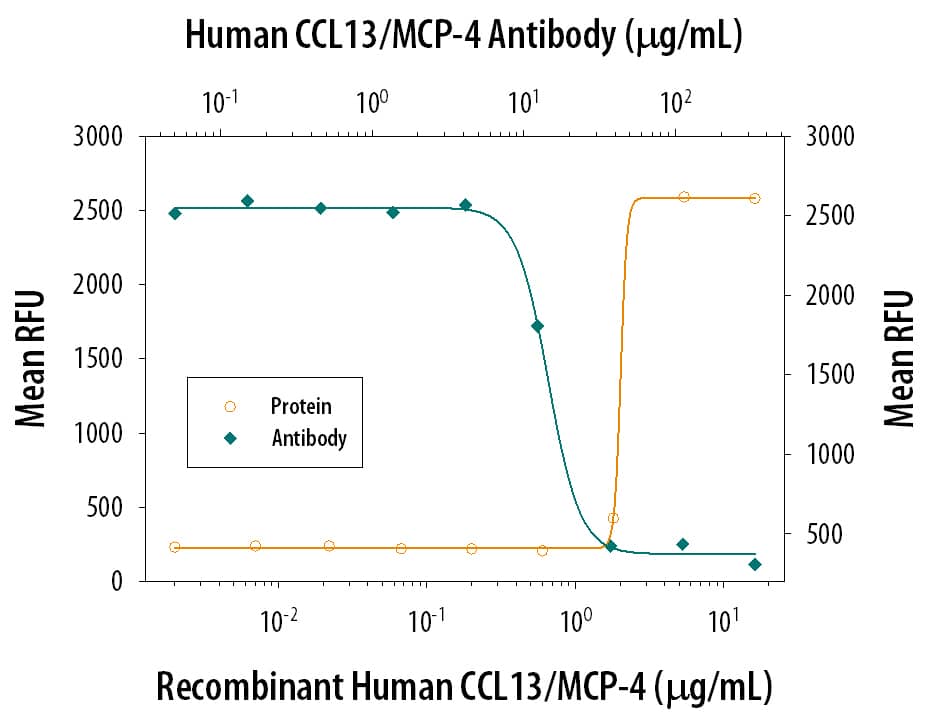Human CCL13/MCP-4 Antibody
R&D Systems, part of Bio-Techne | Catalog # MAB327

Key Product Details
Species Reactivity
Validated:
Cited:
Applications
Validated:
Cited:
Label
Antibody Source
Product Specifications
Immunogen
Gln24-Thr98
Accession # Q99616.1
Specificity
Clonality
Host
Isotype
Endotoxin Level
Scientific Data Images for Human CCL13/MCP-4 Antibody
Chemotaxis Induced by CCL13/MCP‑4 and Neutral-ization by Human CCL13/ MCP‑4 Antibody.
Recombinant Human CCL13/ MCP-4 (Catalog # 327-P4) chemoattracts the BaF3 mouse pro-B cell line transfected with human CCR2A in a dose dependent manner (orange line). The amount of cells that migrated through to the lower chemotaxis chamber was measured by Resazurin (Catalog # AR002). Chemotaxis elicited by Recombinant Human CCL13/MCP-4 (2 µg/mL) is neutralized (green line) by increasing concentrations of Mouse Anti-Human CCL13/ MCP-4 Monoclonal Antibody (Catalog # MAB327). The ND50 is typically 10-30 µg/mL.Applications for Human CCL13/MCP-4 Antibody
Neutralization
Human CCL13/MCP-4 Sandwich Immunoassay
Formulation, Preparation, and Storage
Purification
Reconstitution
Formulation
*Small pack size (-SP) is supplied either lyophilized or as a 0.2 µm filtered solution in PBS.
Shipping
Stability & Storage
- 12 months from date of receipt, -20 to -70 °C as supplied.
- 1 month, 2 to 8 °C under sterile conditions after reconstitution.
- 6 months, -20 to -70 °C under sterile conditions after reconstitution.
Background: CCL13/MCP-4
CCL13, also known as Monocyte Chemoattractant Protein-4 (MCP-4), is a CC chemokine that acts as a chemoattractant for monocytes, eosinophils and T cells and as an activator of basophils. Human CCL13 cDNA encodes a 98 amino acid residue precursor protein with a 23 amino acid residue hydrophobic signal peptide that is cleaved to yield an 8 kDa, 75 aa mature CCL13. Mature CCL13 lacks any potential N-glycosylation sites and shares a pyroglutamate proline motif with other human MCP proteins. Human CCL13 is most homologous to MCP-1, 3 and Eotaxin, exhibiting approximately 65-66% amino acid sequence identity. CCL13 mRNA is expressed by a number of activated cell types, including endothelial cells, macrophages, bronchial epithelium and type II alveolar cells, and perhaps lymphocytes. The bioactivities of CCL13 are mediated by the CC chemokine receptors CCR-2 and CCR-3.
Additional CCL13/MCP-4 Products
Product Documents for Human CCL13/MCP-4 Antibody
Product Specific Notices for Human CCL13/MCP-4 Antibody
For research use only
